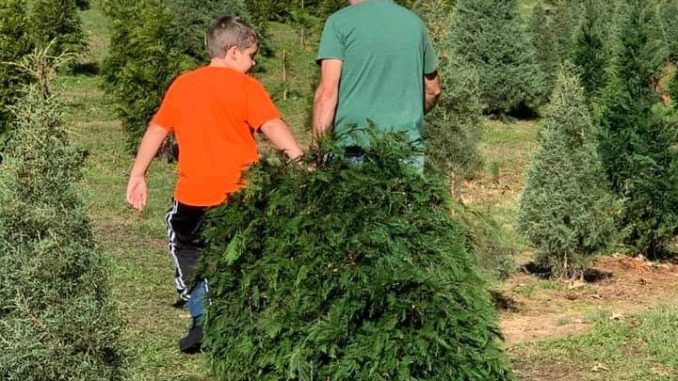
ALBEMARLE — The Almond Christmas Tree Farm and the Grovestone Christmas Tree Farm, both in Albemarle, sold out of trees quickly in 2020, with a shortage of trees from western N.C. causing a buying frenzy. People drove from hours away hoping to buy a tree from one of Stanly County’s two Christmas tree farms before they were all gone — and the crop didn’t last long.
After Oregon, North Carolina produces more Christmas trees than any other state, with almost 40,000 acres of trees, according to the National Agricultural Statistics Service. The majority of these trees are Fraser firs grown in North Carolina’s mountains. But after the economic crash in 2008, many farms went out of business and many others skipped a few years of planting.
“And right now we’re seeing the product of that because there’s no trees. So we’re relying just on those that did stay in business for the Fraser fir trees,” Earl Almond of Almond Christmas Tree Farm told SCJ.
Almond said this shortage has been around for two years and predicts it will take another two before the western N.C. Fraser fir farms can get their production back since it can take around eight years for a tree to be ready for sale.
Jerry Talbert of Grovestone Christmas Tree Farm agreed that this shortage is what is causing the mad dash for Christmas trees in the Piedmont.
“There’s just no Fraser firs around,” Talbert told SCJ. “So people were going to local farms, and we had over 200 trees ready to sell. We sold them in the first two weekends.”
Talbert said most years, they have their regular local customers, but this year they had “a ton of people coming out of Charlotte” and a lot of people from out-of-state or more distant parts of North Carolina, like Raleigh.
“We haven’t had that before,” Talbert said.
Likewise, Almond’s crop went fast, and much of it went to people from much further out than usual. They sold their usual 400 trees, but he says, “They just went quick. We sold out in about six days.” Most years, it takes three weekends to sell the full crop. Last year it took two weekends, and this year, Almond said, it took just over one weekend.
“We had more traffic from the Charlotte area, and we had people from as far as Cheraw, South Carolina, Charlotte, Salisbury, Winston-Salem — people just came from all over,” Almond said.
In a normal year, there would be Christmas tree lots in all of these local areas, and most people would buy Fraser firs from the lots. However, with limited crop, these lots are missing across the state, including in Stanly County, causing ramped–up local demand as well.
“For the last couple years, it is my understanding there have been no tree lots, or maybe one, in Stanly County, where there used to be four or five,” Talbert said.
While 98% of Christmas trees in N.C. are Fraser firs, according to Justin Whitehill, director of the Christmas Tree Genetics Program at NC State University, those trees don’t grow at lower altitudes.
Talbert said Fraser firs can only thrive above 2,500 feet elevation, so in the Piedmont, they need to use other varieties. At Grovestone, they grow Leyland Cypress, and Almond grows Leyland Cypress, White Pine, Virginia Pine, Carolina Sapphire and Blue Ice. With demand as high as it is, all of these varieties sell quickly.
“In the Piedmont area, it’s just however much time and land you have to grow trees — there’s no limit,” Almond said. “To be able to sell 400 trees each year, you’ve got to have five times that amount available, at different stages, from seedlings up to 6- to 8-foot trees.”
Almond said this means he has to have 1,700 trees in the field to be able to sell those 400 trees per year, and he replants 400 each year to replace the ones purchased. In typical years, he also purchases another 150 Fraser firs from the mountains to sell.
Talbert said he typically has 200 trees available for sale. Next year, however, he is only planning on having 100 because he is “phasing out of the Christmas tree business.”
“I’m not planting anymore, just because I’m going to retire,” Talbert said. “Probably next season is going to end me up. I’ve been doing it for 31 years. So, we’ll have some trees to begin with, but if they don’t come on the first weekend or two, we’ll be out of trees.”
Almond is aware that Talbert is retiring but said he doesn’t have the time or land to increase his production to make up for the supply lost. Almond is helping a young family in Cabarrus County learn the trade, though, and says their first crop of trees will be ready in about five years.
